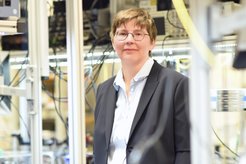Nathalie Picqué wins Falling Walls Award „Science Breakthrough of the Year”
She receives the price for her work on optical sensing with interfering rainbows of light waves.
Every year on 9 November, the Falling Walls Science Summit in Berlin honours major "Science Breakthroughs of the Year" and commemorates the historic fall of the Berlin Wall. The award is given for groundbreaking research results in all academic disciplines. Today, the Falling Walls Awards Foundation announced the winners for 2022. In the category “Physical Sciences”, Nathalie Picqué has been chosen by an expert jury out of about 100 nominees, 30 international “Finalists” and 10 “Winners”. She receives the honour for her development of the dual-comb interferometer, which can be used in spectroscopy and holography and offers unique features such as frequency measurements, accuracy, precision and speed.
In this short video she gives some insight into her research achievements and goals:
Falling Walls Global Call Winner 2022: Nathalie Picqué
Nathalie Picqué, research group leader in the Laser Spectroscopy Division at the Max Planck Institute of Quantum Optics, and her team are exploring new ideas around the concepts of interfering light waves and laser frequency combs. Such frequency combs provide a broad spectrum of precisely evenly spaced spectral lines, with frequencies that can be known with the accuracy of an atomic clock. Dr. Picqué has shown how to study molecular fingerprints more accurately than ever before by interrogating broadband molecular spectra with thousands or millions of comb lines simultaneously. She uses a single fast photodetector to measure the radio frequency interference signal between two optical frequency combs of slightly different line spacing. No moving mirrors are needed, and the recording speed can be up to a million times faster than that of a traditional Fourier transform spectrometer. Dual-comb spectroscopy records signals by scanning the time interval between ultrashort light pulses, so that the resolution is not limited by the size of the spectrometer. A microfabricated highly selective sensor for molecular gases in air could fit into a smartphone.

Nathalie Picqué has even demonstrated dual-comb spectroscopy with photon-counting detectors at very low intensities. By replacing the single detector by a fast camera, she has recently demonstrated a new type of digital holography, which produces a spectral hypercube of holograms. With one hologram per comb line, molecule-selective 3-dimensional imaging and precise absolute geometric measurements without phase ambiguity are becoming possible. “In the future, we may be able to measure the shape of a large 3-dimensional object to within the size of an atom” explains Dr. Picqué.
Nathalie Picqué has received several prizes and awards, including the 2021 Gentner-Kastler Prize of the French and German Physical Societies. In 2022 she became the first woman scientist in Germany working in AMO Physics to receive an ERC Advanced Grant.
“I am looking forward to presenting our work to a large audience during the Falling Walls Science Breakthrough Day in Berlin on November 9, 2022.”, explains Nathalie Picqué. “ My team and I are eager to see which wall we can knock down next.”













